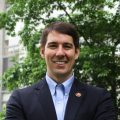16th Assembly District
Not in 16th Assembly District? Find your guide.
RETURN BALLOTS BY TUESDAY, MARCH 3RD
The Courage California Voter Guide compiles the information that allows you to make informed decisions about the races on your ballot, based on your values. Vote in every race on your ballot! It's our right and our responsibility. Please share this guide with your friends and family.
Have questions about voting in Alameda County? Read our guide to voting in Alameda County.
Congress
10th Congressional District
Rep. Josh Harder lives in his hometown of Turlock, CA. He is the incumbent, having beat the sitting republican in a tight race in 2018, which helped Democrats to win back control of Congress. According to campaign materials, Harder is running for re-election to protect access to health care, create good-paying jobs, reform our broken immigration system, and to secure and grow his area’s water supply.
In Congress, Rep. Harder has advocated for the needs of the agriculture industry by addressing issues of climate change, and has fought to support California’s farmers. Rep. Harder currently sits on the House Committees on Education and Labor, as well as the Agriculture Committee. Prior to serving in congress, Harder was a business professor at Modesto Junior College. Harder has also passed on his small business knowledge to developing economies through volunteer efforts. While working at Boston Consulting Group, he took a leave of absence to help small farmers in Kenya and Uganda organize for economic cooperation and development.
Rep. Harder is running against Michael “Mike” Barkley (D), Ryan Blevins (D), Bob Elliot (R), Maria Sousa Livengood (R), and Ted Howze (R). According to recent election results, it's difficult for Democrats to win this seat as Rep. Harder did in 2018. His strong progressive track record as well as his recent win in a recently flipped district make him the strongest choice in this race.
Rep. Josh Harder lives in his hometown of Turlock, CA. He is the incumbent, having beat the sitting republican in a tight race in 2018, which helped Democrats to win back control of Congress. According to campaign materials, Harder is running for re-election to protect access to health care, create good-paying jobs, reform our broken immigration system, and to secure and grow his area’s water supply.
In Congress, Rep. Harder has advocated for the needs of the agriculture industry by addressing issues of climate change, and has fought to support California’s farmers. Rep. Harder currently sits on the House Committees on Education and Labor, as well as the Agriculture Committee. Prior to serving in congress, Harder was a business professor at Modesto Junior College. Harder has also passed on his small business knowledge to developing economies through volunteer efforts. While working at Boston Consulting Group, he took a leave of absence to help small farmers in Kenya and Uganda organize for economic cooperation and development.
Rep. Harder is running against Michael “Mike” Barkley (D), Ryan Blevins (D), Bob Elliot (R), Maria Sousa Livengood (R), and Ted Howze (R). According to recent election results, it's difficult for Democrats to win this seat as Rep. Harder did in 2018. His strong progressive track record as well as his recent win in a recently flipped district make him the strongest choice in this race.
14th Congressional District
Jackie Speier was born and raised in San Francisco. She has been a lifelong public servant, having first been elected to the San Mateo County Board of Supervisors in 1980. She won a special primary election for the 14th Congressional District on April 8, 2008 and has run on platforms advocating for gender equity, gun violence prevention, and LGBTQ equality.
Speier began her political career as a congressional staffer for Congressman Leo Ryan. While a congressional staffer for Congressman Leo Ryan, Speier went on a fact finding mission to investigate the Jonestown settlement, where she sustained five gunshot wounds during the massacre. She has co-sponsored and supported numerous pieces of legislation on gun violence prevention in her time in office since.
Speier has long fought for women’s rights as well as LGBTQ equality. She supports adding LGBTQ protections to ENDA, Title IX protections, gender pay equity, the Equal Rights Amendment, the #MeToo movement, and abortion protections. She has opposed discrimination on the basis of religious protection, and Trump’s Transgender Military Service Ban.
In Congress, Speier also helped secure funding for the district’s CalTrain services, and been active on legislation to address climate change. She supports the Green New Deal and policies to develop renewable energies and make them more accessible.
Jackie Speier is being challenged by Cristos Goodrow (D), Ran S. Petel (R), and Eric Taylor (NPP). Based on our analysis, Speier has consistently been a strong progressive voice in Congress and is the strongest choice for progressive leadership in office.
Jackie Speier was born and raised in San Francisco. She has been a lifelong public servant, having first been elected to the San Mateo County Board of Supervisors in 1980. She won a special primary election for the 14th Congressional District on April 8, 2008 and has run on platforms advocating for gender equity, gun violence prevention, and LGBTQ equality.
Speier began her political career as a congressional staffer for Congressman Leo Ryan. While a congressional staffer for Congressman Leo Ryan, Speier went on a fact finding mission to investigate the Jonestown settlement, where she sustained five gunshot wounds during the massacre. She has co-sponsored and supported numerous pieces of legislation on gun violence prevention in her time in office since.
Speier has long fought for women’s rights as well as LGBTQ equality. She supports adding LGBTQ protections to ENDA, Title IX protections, gender pay equity, the Equal Rights Amendment, the #MeToo movement, and abortion protections. She has opposed discrimination on the basis of religious protection, and Trump’s Transgender Military Service Ban.
In Congress, Speier also helped secure funding for the district’s CalTrain services, and been active on legislation to address climate change. She supports the Green New Deal and policies to develop renewable energies and make them more accessible.
Jackie Speier is being challenged by Cristos Goodrow (D), Ran S. Petel (R), and Eric Taylor (NPP). Based on our analysis, Speier has consistently been a strong progressive voice in Congress and is the strongest choice for progressive leadership in office.
State Assembly, 16th District
Rebecca Bauer-Kahan was raised in the Bay Area. She is the incumbent, having served in this position since 2018. According to campaign materials she is running for re-election to continue to use her leadership position to advocate for social issues and improve equity in the community.
In the State Assembly, Bauer-Kahan has worked on legislation to reallocate public funding to parks and schools and transportation projects, to protect women’s health and abortion rights, to codify standards for serving food allergens, and to instate protections for California college students. Shortly after her election in 2018, she was selected to serve as Assistant Speaker pro Tempore in the Assembly. She currently serves as Chair of the Select Committee on Women’s Reproductive Health, and sits on an additional four committees, including Environmental Safety & Toxic Materials, Privacy and Consumer Protection, Public Safety, and Banking & Finance.
Prior to her election to the State Assembly, Bauer-Kahan worked as an attorney, primarily on cases related to corporate environmental compliance and intellectual property. Her work involved an investigation of company practices, a detailed understanding of existing regulations, and how to balance compliance with profitability. Additionally, she has taught law at Santa Clara University and Golden Gate University. Bauer-Kahan has also used her professional credentials to benefit her community by growing her office’s pro-bono program to address cases related to civil rights and homelessness, and by partnering with the International Refugee Assistance Project (IRAP) to provide legal services at San Francisco International Airport after the Trump Administration’s travel ban.
Bauer-Kahan is being challenged by Joseph Rubay (R). In 2019, she scored an 81 out of 100 on Courage Score, our annual analysis of legislator's progressive voting records. Based on our Courage Score analysis, Bauer-Kahan has consistently shown great courage in advocating for the needs of constituents and facing down corporate lobbyists and interest groups that exploit Californians.
According to our analysis, Rebecca Bauer-Kahan is the strongest choice for progressive leadership in office.
Rebecca Bauer-Kahan was raised in the Bay Area. She is the incumbent, having served in this position since 2018. According to campaign materials she is running for re-election to continue to use her leadership position to advocate for social issues and improve equity in the community.
In the State Assembly, Bauer-Kahan has worked on legislation to reallocate public funding to parks and schools and transportation projects, to protect women’s health and abortion rights, to codify standards for serving food allergens, and to instate protections for California college students. Shortly after her election in 2018, she was selected to serve as Assistant Speaker pro Tempore in the Assembly. She currently serves as Chair of the Select Committee on Women’s Reproductive Health, and sits on an additional four committees, including Environmental Safety & Toxic Materials, Privacy and Consumer Protection, Public Safety, and Banking & Finance.
Prior to her election to the State Assembly, Bauer-Kahan worked as an attorney, primarily on cases related to corporate environmental compliance and intellectual property. Her work involved an investigation of company practices, a detailed understanding of existing regulations, and how to balance compliance with profitability. Additionally, she has taught law at Santa Clara University and Golden Gate University. Bauer-Kahan has also used her professional credentials to benefit her community by growing her office’s pro-bono program to address cases related to civil rights and homelessness, and by partnering with the International Refugee Assistance Project (IRAP) to provide legal services at San Francisco International Airport after the Trump Administration’s travel ban.
Bauer-Kahan is being challenged by Joseph Rubay (R). In 2019, she scored an 81 out of 100 on Courage Score, our annual analysis of legislator's progressive voting records. Based on our Courage Score analysis, Bauer-Kahan has consistently shown great courage in advocating for the needs of constituents and facing down corporate lobbyists and interest groups that exploit Californians.
According to our analysis, Rebecca Bauer-Kahan is the strongest choice for progressive leadership in office.
State Senate
State Senator, 5th District
Susan Eggman is from Turlock, CA, just south of State Senate District 5, and currently resides in Stockton, CA. She is the incumbent in this race. According to campaign materials, she is running for State Senate to fight for her community’s right to clean water, ensure that veterans receive the care they have earned, and increase access to quality education throughout the Central Valley.
Eggman advocates for her community's needs in the state capitol. As an assembly member, she’s led the project to develop a California State University in Stockton, has challenged delays in establishing the French Camp CA Medical Clinic, and has been an ongoing voice of opposition towards the proposal to develop tunnels through the San Joaquin Delta. Prior to becoming a state legislature, Eggman worked as a social worker focused on addressing issues pertaining to substance abuse, and also served in the Stockton City Council and the United States Army as a combat medic.
Eggman is running against Mani Grewal (D), Jesús Andrade (R), Kathleen Garcia (R), and Jim Ridenor (R). In 2019, as an assembly member, Eggman scored 86 out of 100 on Courage Score, our annual analysis of a legislator's progressive voting records. Based on our Courage Score analysis, Eggman has consistently shown great courage advocating for the needs of constituents and facing down corporate lobbyists and interest groups that exploit Californians.
According to our analysis, Eggman is the strongest choice for progressive leadership in office.
Susan Eggman is from Turlock, CA, just south of State Senate District 5, and currently resides in Stockton, CA. She is the incumbent in this race. According to campaign materials, she is running for State Senate to fight for her community’s right to clean water, ensure that veterans receive the care they have earned, and increase access to quality education throughout the Central Valley.
Eggman advocates for her community's needs in the state capitol. As an assembly member, she’s led the project to develop a California State University in Stockton, has challenged delays in establishing the French Camp CA Medical Clinic, and has been an ongoing voice of opposition towards the proposal to develop tunnels through the San Joaquin Delta. Prior to becoming a state legislature, Eggman worked as a social worker focused on addressing issues pertaining to substance abuse, and also served in the Stockton City Council and the United States Army as a combat medic.
Eggman is running against Mani Grewal (D), Jesús Andrade (R), Kathleen Garcia (R), and Jim Ridenor (R). In 2019, as an assembly member, Eggman scored 86 out of 100 on Courage Score, our annual analysis of a legislator's progressive voting records. Based on our Courage Score analysis, Eggman has consistently shown great courage advocating for the needs of constituents and facing down corporate lobbyists and interest groups that exploit Californians.
According to our analysis, Eggman is the strongest choice for progressive leadership in office.
State Senator, 9th District
Nancy Skinner has lived in Berkley, CA for over 40 years. She is the incumbent State Senator in District 9, having served in this position since 2017. According to campaign materials, she is running for re-election to continue to build on her record of fighting for criminal justice reform, affordable housing, and increased environmental protections across the state.
In the State Senate, Skinner has authored two significant criminal justice reform bills to increase police accountability and overhaul the felony murder rule. She has also authored legislation to improve California’s affordable housing shortage, and to protect the environment through the reduction of greenhouse gas emissions. Skinner currently serves as the Chair of the Public Safety Committee and the Public Safety Budget Committee, and is a member of an additional six committees. Prior to her election to the State Senate, Skinner served three terms in the State Assembly, was the first student to be elected to the Berkeley City Council, and served as the Executive Director of ICLEI’s United States office which worked with international cities to stop climate change. As a graduate Student at Berkeley, Skinner co-founded the labor union that represents graduate student instructors.
Nancy Skinner is running unopposed in this race. She scores a lifetime 97 out of 100 on Courage Score, our annual analysis of legislators’ progressive voting record. Based on our Courage Score analysis, Skinner has consistently shown great courage by advocating for the needs of constituents and facing down corporate lobbyists and interest groups that exploit Californians.
According to our analysis, Nancy Skinner is the strongest choice for progressive leadership in office.
Nancy Skinner has lived in Berkley, CA for over 40 years. She is the incumbent State Senator in District 9, having served in this position since 2017. According to campaign materials, she is running for re-election to continue to build on her record of fighting for criminal justice reform, affordable housing, and increased environmental protections across the state.
In the State Senate, Skinner has authored two significant criminal justice reform bills to increase police accountability and overhaul the felony murder rule. She has also authored legislation to improve California’s affordable housing shortage, and to protect the environment through the reduction of greenhouse gas emissions. Skinner currently serves as the Chair of the Public Safety Committee and the Public Safety Budget Committee, and is a member of an additional six committees. Prior to her election to the State Senate, Skinner served three terms in the State Assembly, was the first student to be elected to the Berkeley City Council, and served as the Executive Director of ICLEI’s United States office which worked with international cities to stop climate change. As a graduate Student at Berkeley, Skinner co-founded the labor union that represents graduate student instructors.
Nancy Skinner is running unopposed in this race. She scores a lifetime 97 out of 100 on Courage Score, our annual analysis of legislators’ progressive voting record. Based on our Courage Score analysis, Skinner has consistently shown great courage by advocating for the needs of constituents and facing down corporate lobbyists and interest groups that exploit Californians.
According to our analysis, Nancy Skinner is the strongest choice for progressive leadership in office.
Alameda County Superior Court
Elena Condes an LGBTQ+ Latinx attorney who has been in private practice in the Bay Area for over 20 years. Her practice offers criminal defense, work-related crimes, clearing criminal records, and other services. In her campaign materials, she says she will bring together all of her experiences to provide “equal access to justice” for all.
Condes is currently the treasurer for East Bay La Raza Lawyers Association, which she has been a member of for 18 years. She also served on the board of Women Defenders, a professional organization of women criminal defense attorneys and served on the Executive Committee of Alameda County Court Appointed Attorneys Program (CAAP).
Condes received the sole endorsement from the East Bay Times, who said Condes “stands out as the best experienced and most familiar with the workings of Alameda County courts. Condes’ practice focuses on courtroom advocacy that’s a key part of the day-to-day operations of the local judicial system.” Condes has been endorsed by Alameda County Superior Court Judge Carol Brosnahan, the judge who is retiring and leaving this seat open.
Condes received her undergraduate degree from the University of Arizona and her law degree from Golden Gate University School of Law.
Condes is being challenged by Mark Fickes, a partner at Partner, Cannata O’Toole Fickes & Olson, who previously worked at the Securities and Exchange Commission, and Lilla Julia Szelenyi, an administrative law judge for the state workers compensation agency.
Based on our analysis, Elena Condes is the best choice for judge in Alameda County.
Elena Condes an LGBTQ+ Latinx attorney who has been in private practice in the Bay Area for over 20 years. Her practice offers criminal defense, work-related crimes, clearing criminal records, and other services. In her campaign materials, she says she will bring together all of her experiences to provide “equal access to justice” for all.
Condes is currently the treasurer for East Bay La Raza Lawyers Association, which she has been a member of for 18 years. She also served on the board of Women Defenders, a professional organization of women criminal defense attorneys and served on the Executive Committee of Alameda County Court Appointed Attorneys Program (CAAP).
Condes received the sole endorsement from the East Bay Times, who said Condes “stands out as the best experienced and most familiar with the workings of Alameda County courts. Condes’ practice focuses on courtroom advocacy that’s a key part of the day-to-day operations of the local judicial system.” Condes has been endorsed by Alameda County Superior Court Judge Carol Brosnahan, the judge who is retiring and leaving this seat open.
Condes received her undergraduate degree from the University of Arizona and her law degree from Golden Gate University School of Law.
Condes is being challenged by Mark Fickes, a partner at Partner, Cannata O’Toole Fickes & Olson, who previously worked at the Securities and Exchange Commission, and Lilla Julia Szelenyi, an administrative law judge for the state workers compensation agency.
Based on our analysis, Elena Condes is the best choice for judge in Alameda County.
Alameda County, District 1
Depending on where you live, you may have the below county-districted races on your ballot.
Bob Wieckowski is from the Bay Area and is a longtime resident of Fremont. According to campaign materials, he is running for the Board of Supervisors to use his accumulated experience in city and state government to benefit Alameda residents and address challenges such as income inequality, climate change, and housing affordability.
Wieckowski is currently the State Senator for the 10th district, where he advocates for progressive policies that provide diverse benefits to Californians. He has had a variety of legislative successes, including authoring a bill to eliminate the barriers to constructing Accessory Dwelling Units, working to advance consumer protections, and championing climate research and a clean energy economy. Wieckowski has also been an advocate for college students, working to increase grant funding for tuition, and has pushed back against abusive lenders. Prior to his Senate election, Wieckowski’s public service included time in the State Assembly, on the Fremont City Council, and a term as Vice Mayor.
Wieckowski is running against Dublin Mayor David Haubert, Fremont Councilmember Vinnie Bacon, and Dublin Vice Mayor Melissa Hernandez. While Melissa Hernandez is a strong challenger, Courage California cannot support her because she cast a decisive vote as Vice Mayor of Dublin to deny a request from a gay City Councilman to raise a rainbow flag over City Hall during Pride month. As State Senator, Wieckowski scores a lifetime 92 out of 100 on Courage Score, our annual analysis of legislators’ progressive voting record. He stands out as the progressive choice because of his track record of working to eliminate barriers that create systemic inequality in housing, education, and the economy.
According to our analysis, Bob Wieckowski is the strongest choice for progressive leadership in office.
Bob Wieckowski is from the Bay Area and is a longtime resident of Fremont. According to campaign materials, he is running for the Board of Supervisors to use his accumulated experience in city and state government to benefit Alameda residents and address challenges such as income inequality, climate change, and housing affordability.
Wieckowski is currently the State Senator for the 10th district, where he advocates for progressive policies that provide diverse benefits to Californians. He has had a variety of legislative successes, including authoring a bill to eliminate the barriers to constructing Accessory Dwelling Units, working to advance consumer protections, and championing climate research and a clean energy economy. Wieckowski has also been an advocate for college students, working to increase grant funding for tuition, and has pushed back against abusive lenders. Prior to his Senate election, Wieckowski’s public service included time in the State Assembly, on the Fremont City Council, and a term as Vice Mayor.
Wieckowski is running against Dublin Mayor David Haubert, Fremont Councilmember Vinnie Bacon, and Dublin Vice Mayor Melissa Hernandez. While Melissa Hernandez is a strong challenger, Courage California cannot support her because she cast a decisive vote as Vice Mayor of Dublin to deny a request from a gay City Councilman to raise a rainbow flag over City Hall during Pride month. As State Senator, Wieckowski scores a lifetime 92 out of 100 on Courage Score, our annual analysis of legislators’ progressive voting record. He stands out as the progressive choice because of his track record of working to eliminate barriers that create systemic inequality in housing, education, and the economy.
According to our analysis, Bob Wieckowski is the strongest choice for progressive leadership in office.
Statewide Ballot Measures
This proposition would provide $9 billion for desperately needed renovations to public preschools and grade schools throughout the state, and $6 billion for construction to community colleges, the Cal State system, and the UC system. This will allow the state of California to use tax revenue to pay for improvements that local communities cannot afford.
The funding would come from bonds the state would pay back over 35 years, totaling an estimated $26 billion, which includes $15 billion in principal and $11 billion in interest. This investment is well worth the costs. It takes money, after all, to ensure that students -- especially those in districts that can’t afford major capital improvement projects -- do not have to learn in dangerous environments.
The vast majority of Democrats in the state legislature support it, as does Gov. Newsom, and the only major opposition is a group called the Howard Jarvis Taxpayers Association. This is the group famous for destroying California’s school funding system in 1978 through another proposition, ironically one that was also dubbed Prop 13. The group spends most of its time lobbying to reduce tax rates. It has never shown any interest in supporting California’s children, at least if that means wealthy individuals or giant corporations would pay their fair share in taxes.
Critics of the measure have pointed out that the ballot measure’s language includes a provision that frees new multi-family developments around subway stops and bus stations from school impact fees. This provision will make it easier for developers to build apartment buildings within a half-mile of public transit but could also drive up the cost of new housing and take funds away from school districts across the state. Despite this provision, the measure is still supported by most education groups in the state, who believe the overall funding allocation to schools outweighs the impact of reduced funding to school districts located near transit hubs. 2020’s Prop 13 is worth the investment since it means children will soon be able to attend school in buildings that are retrofitted to withstand earthquakes and no longer have lead in their water.
We strongly recommend a YES vote on Prop 13.
This proposition would provide $9 billion for desperately needed renovations to public preschools and grade schools throughout the state, and $6 billion for construction to community colleges, the Cal State system, and the UC system. This will allow the state of California to use tax revenue to pay for improvements that local communities cannot afford.
The funding would come from bonds the state would pay back over 35 years, totaling an estimated $26 billion, which includes $15 billion in principal and $11 billion in interest. This investment is well worth the costs. It takes money, after all, to ensure that students -- especially those in districts that can’t afford major capital improvement projects -- do not have to learn in dangerous environments.
The vast majority of Democrats in the state legislature support it, as does Gov. Newsom, and the only major opposition is a group called the Howard Jarvis Taxpayers Association. This is the group famous for destroying California’s school funding system in 1978 through another proposition, ironically one that was also dubbed Prop 13. The group spends most of its time lobbying to reduce tax rates. It has never shown any interest in supporting California’s children, at least if that means wealthy individuals or giant corporations would pay their fair share in taxes.
Critics of the measure have pointed out that the ballot measure’s language includes a provision that frees new multi-family developments around subway stops and bus stations from school impact fees. This provision will make it easier for developers to build apartment buildings within a half-mile of public transit but could also drive up the cost of new housing and take funds away from school districts across the state. Despite this provision, the measure is still supported by most education groups in the state, who believe the overall funding allocation to schools outweighs the impact of reduced funding to school districts located near transit hubs. 2020’s Prop 13 is worth the investment since it means children will soon be able to attend school in buildings that are retrofitted to withstand earthquakes and no longer have lead in their water.
We strongly recommend a YES vote on Prop 13.






